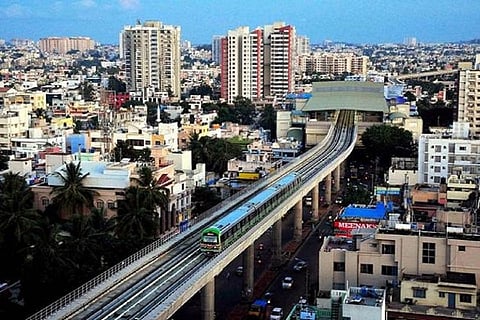

The Karnataka High Court on Wednesday directed the Indian Institute of Management-Bangalore be appointed to assess the works carried out and planned by the Bangalore Metro Rail Corporation Limited (BMRCL) for phase 1 and 2 works. A division bench led by Chief Justice AS Oka also asked BMRCL to submit a draft term of reference that will be submitted to IIM-B by April 8 while hearing public interest litigation.
Petitioners— DT Devare and the BET (Bangalore Environment Trust)—-had gone to court in April 2019 seeking directions for effective implementation of certain mandatory conditions on the basis of which the Bangalore Metro Rail Project was initially approved.
It may be noted that BMRCL, a special purpose vehicle, was set up in 2005 jointly by the Government of India and the Government of Karnataka. These certain conditions included effective implementation of the binding conditions related to a Comprehensive Mobility Plan (CMP) and an Integrated Traffic Ratio Rationalization Plan (ITRRP).
In fact, the petition points out that the relevant authorities have failed to prepare and implement the CMP and the ITRRP despite the lapse of 13 years since the first sanction letter was issued. This came to light through an Right to Information query filed by the petitioners. The authorities include the Government of Karnataka, the Union Ministry of Shipping, Road Transport and Highways, the Union Ministry of Housing and Urban Affairs, the Bangalore Metro Rail Corporation Limited, the Bengaluru Metropolitan Transport Corporation Limited, the Bruhat Bengaluru Mahanagara Palike, the Bangalore Development Authority.
Devare and BET went to court as they felt the BMRCL was not being methodical in their planning and execution but instead was relying on ad-hoc measures to decide on the multi-crore project. And the failure to take an integrated approach to infrastructure development and transport planning by BMRCL has had a direct and crippling effect. These negative effects are not limited to the proper development and utilization of the metro project, but also on the planned development of the mobility infrastructure in the entire city.
The petitioners also found out that not only the CMP and ITRRP, other conditions in the sanction letters and memorandum of understanding between the state and Union governments were not looked into.
These included:
Integration of various modes of transport
Pedestrianization
Public bike sharing facility
Feeder buses
Adequate parking space at stations
Improvement in city bus service
Modern Intelligent Transport Systems (ITS) enabled buses
National Common Mobility Card
Integrated ticketing across all modes
National Public Transport helpline
Parking policy for the city
Advertisement policy for the city
Transit Oriented Development
Land use densification around the stations with mixed land use
First and Last mile connectivity
Furthermore, the petition pointed out that the failure to implement the CMP, ITRRP and other planning measures has, in turn, had a trickle-down impact on the environment (increased vehicular pollution and cutting of trees) and the well-being of citizens too, resulting in a violation of their fundamental rights.
The petitioners have also detailed on the aspects of the following to the court
Massive congestion of traffic,
Severe pollution causing adverse impacts on health
Destruction of urban trees,
Diminished safety on the roads
Reduced and inequitable access to affordable transportation facilities.
Waste of public money